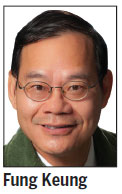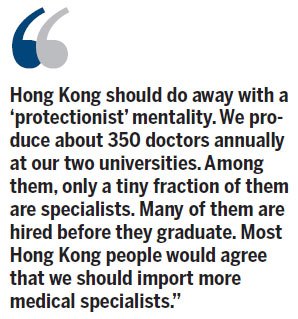Labor shortage in HK: Protectionism outdated
Updated: 2014-04-25 05:22
By Fung Keung(HK Edition)
|
|||||||||
Over the Easter weekend, two stories that appeared on the front page of a local newspaper underscored the Hong Kong government's double standard approach to solving the city's social problems.
One story unveiled that the government is prepared to implement a "fast-track" plan to import construction workers to build the Hong Kong-Shenzhen high-speed railway. But, an acute shortage of labor could hold up completion of the project by two years.
Another article makes people wonder why the government is adopting a double standard approach in importing overseas workers and medical specialists. Both are desperately needed to improve Hong Kong's economy and the people's well-being.
According to the article, 21,000 people need to wait for more than three years before they can see a medical specialist. The figures were given in the Hospital Authority's report submitted to the Legislative Council earlier this month.

Why can't the government import more medical specialists to shorten citizens' waiting time? Overseas medical experts can't practice in Hong Kong unless the government waives the requirement. They normally have to pass local examinations conducted by the Medical Council twice a year before they're allowed to practice here.
The government's double-standard approach is lamentable.
In March, the MTR Corporation said it would need 2,000 more workers to complete the Hong Kong-Shenzhen high-speed railway on time.
A government official told a local newspaper over the weekend that the government would consider applying directly to the Labor Advisory Board to import overseas workers for selected infrastructure projects, including the high-speed railway.
If we're ready to import laborers, we should also consider bringing in more overseas medical specialists.
A Hospital Authority executive said a medical manpower shortage in the SAR remains a crucial factor as it restricts service capacity. He said the shortage is expected to worsen in coming years with a growing population and more elderly people looking for specialist medical treatment.
And, any delay in treatment could cost lives.
In February this year, a young student in Tai Po suffering from depression committed suicide after he was told he would have to wait for a year to see a psychiatrist. It's clear that our city's psychiatrists are overloaded, commented Deborah Crouch, chief executive of The Samaritans Hong Kong Hotline, in a letter to a local newspaper.
In the past eight years, the number of psychiatric patients has risen by 100 percent, while the number of psychiatrists has gone up by less than 10 percent, Crouch said. The student's suicide also drew the attention of the Hong Kong Medical Association. The association suggested that mentally ill patients should be referred to hospital clusters with shorter waiting lists. Hong Kong's public hospitals are located in seven clusters (or districts).

Hospital Authority figures show that the waiting time for psychiatrist outpatient treatment in 2013 ranged from 27 weeks in the New Territories West cluster to 94 weeks (almost two years) for the Kowloon Central cluster.
At present, the Hospital Authority is handling about 210,000 mental-illness cases. In each of the past three years, there were more than 700, 000 cases seeking treatment at psychiatric specialist outpatient clinics for various types of mental problems. Among them, about 200,000 cases involved patients suffering from mood disorder and 150,000 with anxiety disorder.
Hong Kong should do away with a "protectionist" mentality. We produce about 350 doctors annually at our two universities. Among them, only a tiny fraction of them are specialists. Many of them are hired before they graduate. Most Hong Kong people would agree that we should import more medical specialists. With billions of dollars of fiscal reserves that we have, money doesn't appear to be an issue.
All we need is government action. Such "protectionism" is outdated.
The author is coordinator of the B.S.Sc in financial journalism program at Hong Kong Baptist University.
(HK Edition 04/25/2014 page9)